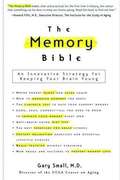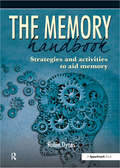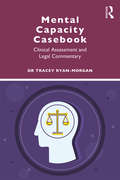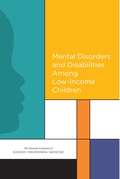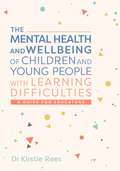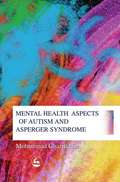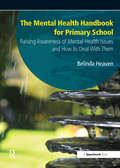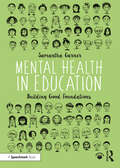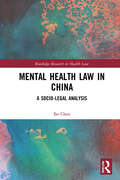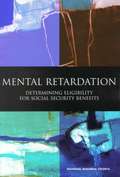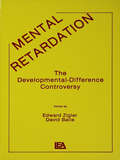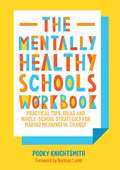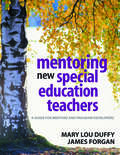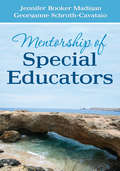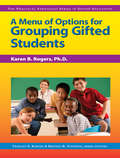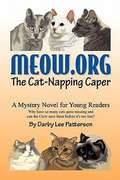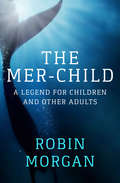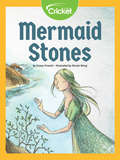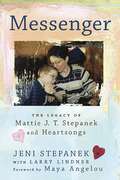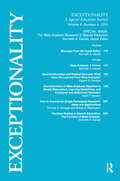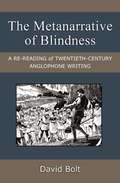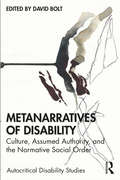- Table View
- List View
The Memory Bible
by Gary SmallGary Small, M.D., is hhead of the Dept. on Aging at UCLA, and he and his colleagues have done research on age-related memory and cognitive disorders, dementia, and Alzheimer's Disease. For caregivers, their families, and patients who must cope with these disorders.
The Memory Handbook: Strategies and Activities to Aid Memory
by Robin DynesThis is a handbook full of practical ideas to use with anyone who is experiencing mild to severe memory difficulties. The suggestions and activities can be used when working with individuals or groups. The strategies can, in fact, be used by anyone young or old, who has become worried about loss of memory. The handbook provides: information about how memory works and different types of memory; an outline of what can affect memory; strategies to aid memory; activities to practice using the strategies; and activities to keep the brain active and maintain memory. The resource is aimed at staff in care environments such as residential homes, day centres, social clubs, support groups, carers or anyone who might be concerned about loss of memory. It promotes understanding about memory difficulties and provides a wide range of strategies and activities to aid response to individual need. Approximately 200pp; A4 wire-o-bound.
Mended Wheels
by Ann Bell Judy SagalChristian romance set in Missouri in which one of the main characters is disabled.
Mental Capacity Casebook: Clinical Assessment and Legal Commentary
by Tracey Ryan-MorganThe Mental Capacity Act 2005 (MCA) provides a legal framework for acting on behalf of individuals who lack the capacity to make decisions for themselves. The Mental Capacity Casebook showcases numerous real-life case studies in accordance to this Act. Through the exploration of various mental capacity assessments, this book highlights the psychological needs of the individuals who are supported and protected by the MCA. Dr. Tracey Ryan-Morgan, a Consultant Clinical Neuropsychologist, is the first to bridge the gap between the individual’s psychological requirements and the legal framework surrounding them. Not only does this book present true, often complex, mental capacity assessments, it does so with legitimate corresponding commentaries. Each case outlines the presented problem along with its background, social context, psychological matters, the overriding opinion and concluding learning points. This book provides a unique standpoint, offering insight into the complexities of the Act and practical guidance on how to conduct assessments. It serves as essential reading for those looking for guidance whilst making complex capacity decisions, such as Clinical Neuropsychologists, Social Workers, and Legal Professionals.
Mental Disorders and Disabilities Among Low-Income Children
by Thomas F. BoatChildren living in poverty are more likely to have mental health problems, and their conditions are more likely to be severe. Of the approximately 1. 3 million children who were recipients of Supplemental Security Income (SSI) disability benefits in 2013, about 50% were disabled primarily due to a mental disorder. An increase in the number of children who are recipients of SSI benefits due to mental disorders has been observed through several decades of the program beginning in 1985 and continuing through 2010. Nevertheless, less than 1% of children in the United States are recipients of SSI disability benefits for a mental disorder. At the request of the Social Security Administration, "Mental Disorders and Disability Among Low-Income Children" compares national trends in the number of children with mental disorders with the trends in the number of children receiving benefits from the SSI program, and describes the possible factors that may contribute to any differences between the two groups. This report provides an overview of the current status of the diagnosis and treatment of mental disorders, and the levels of impairment in the U. S. population under age 18. The report focuses on 6 mental disorders, chosen due to their prevalence and the severity of disability attributed to those disorders within the SSI disability program: attention-deficit/hyperactivity disorder, oppositional defiant disorder/conduct disorder, autism spectrum disorder, intellectual disability, learning disabilities, and mood disorders. While this report is not a comprehensive discussion of these disorders, "Mental Disorders and Disability Among Low-Income Children" provides the best currently available information regarding demographics, diagnosis, treatment, and expectations for the disorder time course - both the natural course and under treatment.
The Mental Health and Wellbeing of Children and Young People with Learning Difficulties: A Guide for Educators
by Kirstie ReesKnowing when children and young people are struggling, and identifying the best ways of supporting them is vital. This is all the more important when working with children with varying learning difficulties who may not always be able to communicate their feelings.By demystifying terms such as mental health, wellbeing, learning difficulties and the sensitivities surrounding labels, this practical and evidence-based guide helps you achieve an in-depth understanding of the children and young people you work with. It provides you with skills and knowledge for supporting their mental health and wellbeing in educational settings - from nursery to secondary school in both mainstream and specialist environments with talking and non-verbal communication approaches to accommodate varying needs. Most importantly its holistic approach explores the interaction between the child's learning difficulties and the psychological, social and environmental factors which influence how they manage their ups and downs in life. This lets you think beyond the child and the classroom.
Mental Health Aspects of Autism and Asperger Syndrome
by Mohammad GhaziuddinThe first book to address the increasingly urgent need for information about psychiatric problems in people with autism spectrum disorders (ASDs), Mental Health Aspects of Autism and Asperger Syndrome systematically explains the emotional and psychological difficulties that are often encountered with ASDs. The author, an experienced psychiatrist specializing in autism, describes each of the conditions that are commonly seen in autistic children and adults, including schizophrenia, depression, anxiety, and tic disorders, and gives sound guidance on their early detection and treatment. Easy to use and authoritative, this book is an essential tool for use by both family and professionals.
The Mental Health Handbook for Primary School: Raising Awareness of Mental Health Issues and How to Deal with Them
by Belinda HeavenThe stigma attached to mental health and the social barriers that surround it amplify its direct effects and damage the life chances of people with mental health problems. Department of Health (2011) Educating children and young people about mental health is of vital importance if we are to challenge the ignorance and stigma related to this area of health. Many young people will be living in families where an adult member may have mental health problems or indeed may be facing similar problems themselves. This book provides a comprehensive resource to help teachers deal sensitively with this important area. Part One provides an introduction and background information highlighting the need to tackle Mental Health in primary schools. The facts are startling - 10% of 10-16 year olds have a diagnosed mental health disorder, there is an increasing number of children self-harming and an alarming increase in early eating disorders. This section provides clear guidance on how to use the programme, including working with parents and answering questions children may ask. Part Two details a comprehensive PowerPoint presentation introducing staff to the programme. Part Three provides wide-ranging lesson materials with comprehensive teacher notes and including all the necessary copiable resources for using the programme from years 3 through to 6. Part Four has a Glossary of Terms as well as a valuable Resource Directory to direct the busy teacher to other useful sources of information. The accompanying downloadable resources include: activity pages; a model letter for parents; and, staff PowerPoint.
Mental Health in Education: Building Good Foundations
by Samantha GarnerMental health and well-being are becoming increasingly important areas of focus in education, yet schools often find themselves lacking the tools, time and resources to tackle the issues. Mental health support is frequently seen as an additional responsibility of the school setting, rather than a core aspect of it. This practical, fully accessible book provides straightforward guidance and low-budget strategies to help school settings get mental health support right. With a focus on the well-being of both students and staff, chapters focus on techniques to develop self-esteem, manage behaviour and build positive relationships at all levels. Key features include: low-cost and easy-to-implement strategies suitable for the busy classroom environment, as well as whole school approaches downloadable activities and planning sheets based on cognitive behavioural therapy techniques a focus on building strong foundations based on mental health basics Refreshingly honest and conscious of the realities of the school environment, this book is a crucial tool for anybody working within education.
Mental Health Law in China: A Socio-legal Analysis (Routledge Research in Health Law)
by Bo ChenThis book provides an important critique of mental health law and practice in China, with a focus on involuntary detention and treatment. The work explores China’s mental health law reform regarding treatment decision-making in the new era of the UN Convention on the Rights of Persons with Disabilities (CRPD). It adopts a socio-legal approach, not only by undertaking a comprehensive desk-based analysis of the reforms introduced by China’s Mental Health Law (MHL) but also examining its implementation based on evidence from practice. The book seeks to investigate whether China’s first national MHL takes a step closer to the requirements of the UN Convention on the Rights of Persons with Disabilities on mental health treatment decision-making, and, if not, why not? The book will be of interest to those working in the areas of mental health law and policy, medical law and disability, human rights law, and Asian Studies.
Mental Retardation: Determining Eligibility For Social Security Benefits
by Committee on Disability Determination for Mental RetardationCurrent estimates suggest that between one and three percent of people living in the United States will receive a diagnosis of mental retardation. Mental retardation, a condition characterized by deficits in intellectual capabilities and adaptive behavior, can be particularly hard to diagnose in the mild range of the disability. The U.S. Social Security Administration (SSA) provides income support and medical benefits to individuals with cognitive limitations who experience significant problems in their ability to perform work and may therefore be in need of governmental support. Addressing the concern that SSA’s current procedures are consistent with current scientific and professional practices, this book evaluates the process used by SSA to determine eligibility for these benefits. It examines the adequacy of the SSA definition of mental retardation and its current procedures for assessing intellectual capabilities, discusses adaptive behavior and its assessment, advises on ways to combine intellectual and adaptive assessment to provide a complete profile of an individual's capabilities, and clarifies ways to differentiate mental retardation from other conditions.
Mental Retardation: The Developmental-difference Controversy
by Edward Zigler David BallaPublished in 1983, Mental Retardation is a valuable contribution to the field of Education.
The Mentally Healthy Schools Workbook: Practical Tips, Ideas, Action Plans and Worksheets for Making Meaningful Change
by Pooky KnightsmithThis book is the perfect starting point for anyone looking to promote and encourage mental health in their school, or evaluate their existing provision, in line with current government priorities. It covers not only the day-to-day practical steps you can take to meet the mental health needs of learners, but also a provides a whole bank of ideas for ensuring you adopt a whole-school approach to positive mental health. Pooky Knightsmith lays out tried and tested tools you can use to evaluate the overall mental health of a school, showing how to improve and support the mental health of staff, and how to ensure that the voice of every learner is heard and valued, including the most vulnerable - and that everyone involved with the school feels safe, healthy and happy. Pooky's simple 'litmus test' framework lays out six practical areas you can explore to implement change within your own school, with explanations, sheets to fill in, tips from loads of school staff, and case examples that break these ideas down into easily digestible chunks. This much-needed book is a jumping off point for meaningful change in all aspects of your school community that will promote, support and strengthen mental health at whole-school level.
Mentoring New Special Education Teachers: A Guide for Mentors and Program Developers (1-off Ser.)
by Mary Lou Duffy Dr James W. ForganHow do you avoid the high cost of turnover and retain high-quality special education teachers in such a demanding field? Special education teachers are leaving the field at twice the rate of general education teachers. Why? Mentoring New Special Education Teachers will help administrators and other educators develop and sustain effective mentoring programs specifically designed for special education teachers, providing practical, field-tested activities and resources for both the mentors and the mentees, including such critical elements as: Effectively identifying, recruiting, and selecting mentors Action planning Evaluating progress Addressing diminishing support Dealing with burnout and isolation Vignettes of real-life mentoring experiences Figures, tables, appendices, and Web sites A ready-to-use two-day workshop for training mentors
Mentoring New Special Education Teachers: A Guide for Mentors and Program Developers (1-off Ser.)
by Mary Lou Duffy Dr James W. ForganHow do you avoid the high cost of turnover and retain high-quality special education teachers in such a demanding field? Special education teachers are leaving the field at twice the rate of general education teachers. Why? Mentoring New Special Education Teachers will help administrators and other educators develop and sustain effective mentoring programs specifically designed for special education teachers, providing practical, field-tested activities and resources for both the mentors and the mentees, including such critical elements as: Effectively identifying, recruiting, and selecting mentors Action planning Evaluating progress Addressing diminishing support Dealing with burnout and isolation Vignettes of real-life mentoring experiences Figures, tables, appendices, and Web sites A ready-to-use two-day workshop for training mentors
Mentorship of Special Educators
by Jennifer C. Madigan Georganne S. Schroth-CavataioThe definitive guide for mentoring special education teachers <p><p> The national shortage and high attrition rate of special education teachers are impediments to serving students with special needs. This book helps meet an essential need for attracting, retaining, and supporting special educators. The authors provide a wealth of research-based tools for professional developers to use in multiple settings, including schools with culturally and linguistically diverse students.
A Menu Of Options For Grouping Gifted Students
by Karen B. RogersFrom grouping by ability, to grouping by interest, to grouping by learning style, the use of grouping in the gifted and regular education classroom has proven to be a successful method of instruction for students. Grouping provides teachers with an effective means of providing gifted students with challenging coursework and access to advanced content, and gives students an avenue to create a peer group of other gifted students. Karen B. Rogers, a leader in the field of gifted education, provides teachers with practical advice for choosing a grouping option that best fits their students and information on how to assess their grouping choices. This book gives teachers tips for grouping gifted students in and out of the classroom and provides a menu of options for serving gifted students. This is one of the books in Prufrock Press' popular Practical Strategies Series in Gifted Education. This series offers a unique collection of tightly focused books that provide a concise, practical introduction to important topics concerning the education of gifted children. The guides offer a perfect beginner's introduction to key information about gifted and talented education. Educational Resource
MEOW.ORG: The Cat-Napping Caper
by Darby PattersonThe Crew is a group of four friends that get together to solve mysteries. The four heroes have different physical disabilities, but use their teamwork and talent to investigate cases. In MEOW.ORG, they investigate the sudden disappearance of a number of foster cats.
The Mer-Child
by Robin MorganLove transcends all barriers in this modern fairy tale When the Mer-Child learned the story of the Little Mermaid, he recognized it as the account of his mother and father, the beautiful mermaid and the human man for whom she sacrificed everything. But that love had left their offspring, the Mer-Child, stranded between worlds, as unwelcome in the realm of the sea as in the earth above. Never fitting in, he has been left to wander, searching for friends, his silvery tail fluttering mournfully in the waves. One day he notices a little girl sitting on the beach. Her father must carry her to and from the shore each day because her legs are paralyzed. Her father is black, her mother white, and she is as much an outcast in both communities as the Mer-Child is in his own. Slowly, warily, they find kinship, both in their differences and in their similarities, and they form a bond that changes them forever. What each learns about the value of being different makes this modern-day fairy tale a new classic, with two memorable characters and an enduring message.
The Mermaid Stones
by Claire H. BlatchfordOne day, Thady O’Dowd finds the magical cloak of a mermaid. Knowing that the mermaid, Miranda, can only return to the sea with her cloak, he hides it away in the hope that she will marry him. After many years, Thady is forced to reveal the hidden cloak. Will Miranda be able to forgive him?
Messenger: The Legacy of Mattie J. T. Stepanek and Heartsongs
by Jeni Stepanek Larry LindnerIn Messenger, Jeni Stepanek shares the inspiring story of her son's life. Mattie was born with a rare disorder called Dysautonomic Mitochondrial Myopathy, and Jeni was advised to institutionalize him. Instead, she nurtured a child who transformed his hardships into a worldwide message of peace and hope.
The Meta-Analysis Research in Special Education: A Special Issue of Exceptionality
by Kenneth A. KavaleFirst published in 2001. The purpose of this issue is to demonstrate the advantages of meta-analysis in summarizing research in special education. Toward this end, five articles are included in this issue that deal with methodology, interpretation, and application of meta-analyses. The first article is a brief primer on meta-analysis that compares and contrasts it with more traditional review methods and describes the methodological procedures for conducting a quantitative research synthesis. The second article, summarizes findings from 24 meta-analytic efforts. The third article explores the important issue of face validity: Can we be confident about the findings from meta-analyses? The fourth article examines the controversy surrounding the meta-analysis of single-participant research: What is the best metric? The final paper reviews the process of decision making in special education by showing how meta-analytic findings can provide a comprehensive knowledge base that, combined with wisdom and experience, can be used to decide whether to include particular interventions.
Metamorphosis: Who We Become after Facial Paralysis
by Faye Linda WachsLosing her smile to synkinesis after unresolved Bell’s palsy changed how Faye Linda Wachs was seen by others and her internal experience of self. In Metamorphosis, interviewing over one hundred people with acquired facial difference challenged her presumptions about identity, disability, and lived experience. Participants described microaggressions, internalizations, and minimalizations and their impact on identity. Heartbreakingly, synkinesis disrupts the ability to have shared moments. When one experiences spontaneous emotion, wrong nerves trigger misfeel and misperception by others. One is misread by others and receives confusing internal information. Communication of and to the self is irrevocably damaged. Wachs describes the experience as a social disability. People found a host of creative ways to reinvigorate their sense of self and self-expression. Like so many she interviewed, Wachs experiences a process of change and growth as she is challenged to think more deeply about ableism, identity, and who she wants to be.
The Metanarrative Of Blindness: A Re-reading Of Twentieth-century Anglophone Writing
by David Bolt<P>Although the theme of blindness occurs frequently in literature, literary criticism has rarely engaged the experiential knowledge of people with visual impairments. The Metanarrative of Blindness counters this trend by bringing to readings of twentieth-century works in English a perspective appreciative of impairment and disability. Author David Bolt examines representations of blindness in more than forty literary works, including writing by Kipling, Joyce, Synge, Orwell, H. G. Wells, Susan Sontag, and Stephen King, shedding light on the deficiencies of these representations and sometimes revealing an uncomfortable resonance with the Anglo-American science of eugenics. <P>What connects these seemingly disparate works is what Bolt calls “the metanarrative of blindness,” a narrative steeped in mythology and with deep roots in Western culture. Bolt examines literary representations of blindness using the analytical tools of disability studies in both the humanities and social sciences. His readings are also broadly appreciative of personal, social, and cultural aspects of disability, with the aim of bringing literary scholars to the growing discipline of disability studies, and vice versa. This interdisciplinary monograph is relevant to people working in literary studies, disability studies, psychology, sociology, applied linguistics, life writing, and cultural studies, as well as those with a general interest in education and representations of blindness.
Metanarratives of Disability: Culture, Assumed Authority, and the Normative Social Order (Autocritical Disability Studies)
by David BoltThis book explores multiple metanarratives of disability to introduce and investigate the critical concept of assumed authority and the normative social order from which it derives. The book comprises 15 chapters developed across three parts and, informed by disability studies, is authored by those with research interests in the condition on which they focus as well as direct or intimate experiential knowledge. When out and about, many disabled people know only too well what it is to be erroneously told the error of our/their ways by non-disabled passers-by, assumed authority often cloaked in helpfulness. Showing that assumed authority is underpinned by a displacement of personal narratives in favour of overarching metanarratives of disability that find currency in a diverse multiplicity of cultural representations – ranging from literature to film, television, advertising, social media, comics, art, and music – this work discusses how this relates to a range of disabilities and chronic conditions, including blindness, autism, Down syndrome, diabetes, cancer, and HIV and AIDS. Metanarratives of Disability will be of interest to all scholars and students of disability studies, medical sociology, medical humanities, education studies, cultural studies, and health.
